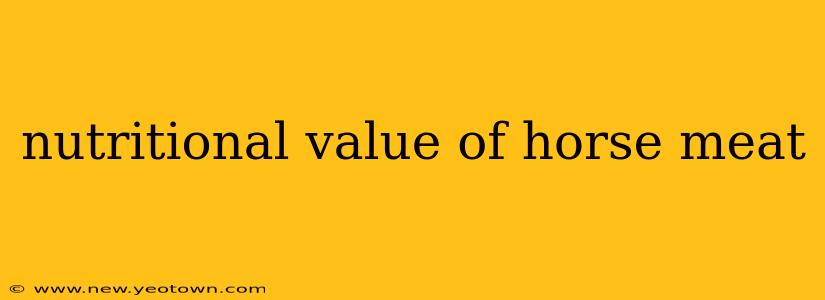For centuries, horse meat has been a staple food in many cultures across the globe, yet in others, it remains a culinary enigma. This often misunderstood meat holds a surprisingly rich nutritional profile, offering a compelling alternative to more conventional protein sources. Let's delve into the fascinating world of horse meat and explore its nutritional value, debunking myths and highlighting its potential benefits.
What is the Nutritional Content of Horse Meat?
Horse meat is a lean, red meat boasting a remarkable nutrient density. Compared to beef, it's lower in fat and calories, while remaining a significant source of high-quality protein and essential micronutrients. A typical 100g serving of horse meat provides approximately:
- Protein: Around 26 grams – crucial for building and repairing tissues, supporting immune function, and producing enzymes and hormones.
- Iron: A significant contributor to red blood cell production, preventing anemia and boosting energy levels.
- Vitamin B12: Essential for nerve function, DNA synthesis, and red blood cell formation. Horse meat is a particularly good source.
- Niacin (B3): Supports healthy metabolism, skin, and nerve function.
- Zinc: Plays a vital role in immune function, wound healing, and cell growth.
- Selenium: A powerful antioxidant protecting cells from damage.
The exact nutritional composition can vary based on factors like the horse's breed, diet, and age. However, consistently, horse meat emerges as a nutrient-rich option.
Is Horse Meat Higher in Protein Than Other Meats?
While horse meat's protein content is impressive, it doesn't necessarily stand out as significantly higher than other lean red meats like beef or venison. The protein content is comparable, making it a strong contender in the protein-rich meat category. The key difference lies in the overall fat content—horse meat tends to be leaner, offering a similar protein punch with fewer calories and fat.
Is Horse Meat Good for Weight Loss?
The lower fat content and relatively higher protein levels in horse meat contribute to its potential benefits for weight management. Protein is known for its satiating effects, helping you feel fuller for longer and potentially reducing overall calorie intake. Furthermore, the lower fat content minimizes the intake of unnecessary calories compared to fattier meats. However, weight loss depends on many factors including overall diet and exercise regime; horse meat is just one piece of the puzzle.
What are the Health Benefits of Eating Horse Meat?
Beyond its nutritional profile, several potential health benefits are associated with horse meat consumption:
- Improved Iron Levels: The substantial iron content is particularly beneficial for individuals prone to iron deficiency anemia.
- Enhanced Energy Levels: The combination of protein and iron contributes to increased energy production and reduced fatigue.
- Stronger Immunity: The presence of zinc and selenium supports the immune system's ability to fight off infections.
- Improved Muscle Function: High-quality protein promotes muscle growth and repair, beneficial for athletes and individuals engaging in regular physical activity.
Is Horse Meat Safe to Eat?
The safety of horse meat hinges primarily on its source and preparation. As with any meat, consuming horse meat from reputable and regulated sources is vital to ensure its safety and minimize the risk of contamination. Proper handling and cooking are also essential steps in preventing foodborne illnesses.
In conclusion, horse meat presents a compelling case as a nutrient-rich and potentially health-beneficial protein source. Its lean nature, coupled with its abundance of essential vitamins and minerals, makes it a worthy addition to a balanced diet. While cultural perceptions may vary, the undeniable nutritional value of horse meat warrants further consideration. Always prioritize sourcing your meat from reputable butchers or suppliers who adhere to strict safety standards.

